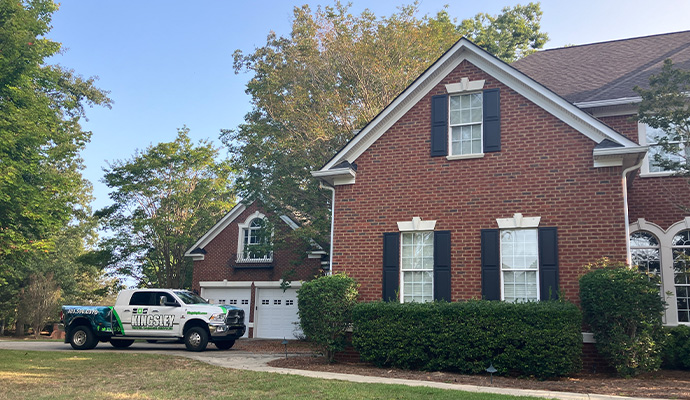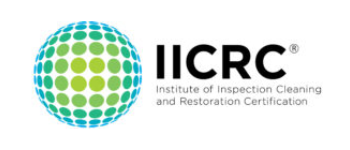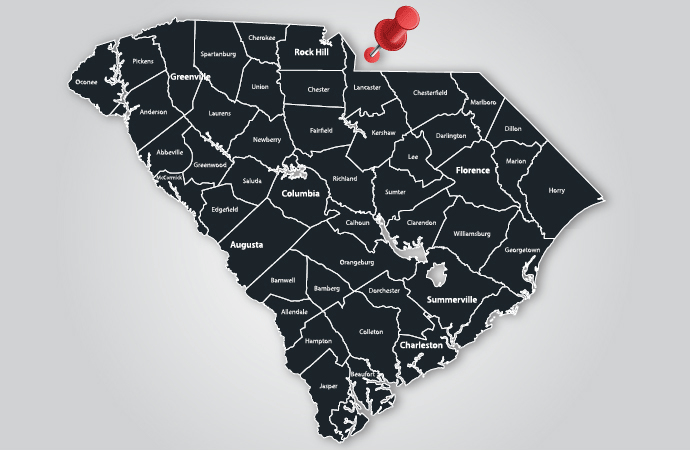Who’s Responsible for Water Damage in South Carolina Apartments
Water damage in apartments can be a stressful and costly issue for both tenants and landlords. Understanding who is responsible for repairs and damages is crucial for all parties involved. In South Carolina, specific laws outline the obligations of landlords and tenants regarding water damage and property maintenance.
On This Page
- Common Causes of Water Damage in Apartments
- Landlord responsibilities in South Carolina
- Tennant responsibilities in South Carolina
- Handling repairs and maintenance
- Importance of renters insurance
- Mold prevention and remediation
- Legal disputes and small claims court
- Tips for tenants and landlords
- Frequently asked questions about water damage for renters
- Kingsley Water Damage & Fire Cleanup services for renters
Common Causes of Water Damage in Apartments
Water damage can occur due to various reasons, including:
- Burst Pipes or Plumbing Issues: Aging or faulty plumbing can lead to leaks or bursts.
- Appliance Leaks: Malfunctioning washing machines, dishwashers, or refrigerators.
- HVAC System Failures: Air conditioning units can produce excess moisture if not maintained.
- Roof Leaks: Storm damage or lack of maintenance can cause roof leaks.
- External Flooding: Heavy rains or natural disasters leading to water intrusion.

Landlord Responsibilities in South Carolina
Under South Carolina law, landlords are required to maintain rental properties in a habitable condition. According to the South Carolina Residential Landlord and Tenant Act, landlords must:
- Comply with Housing and Building Codes: Ensure the property meets all health and safety standards.
- Make Necessary Repairs: Keep the premises in a fit and habitable condition by addressing maintenance issues promptly.
- Maintain Common Areas: Keep shared spaces clean and safe for tenants.
- Provide Essential Services: Supply running water, hot water, and heat, except where the unit is individually metered and directly supplied by a public utility.
For example, if a pipe bursts due to normal wear and tear, the landlord is typically responsible for repairing the pipe and any resulting water damage. Landlords must also ensure that plumbing, heating, and air conditioning systems are in good working order.
Tennant Responsibilities in South Carolina
Tenants also have specific obligations, including:
- Promptly Reporting Issues: Tenants must inform landlords of any water damage or maintenance problems as soon as they are noticed.
- Maintaining the Property: Keep the rental unit clean and dispose of waste properly.
- Preventing Damage: Avoid negligent actions that could cause water damage, such as leaving windows open during rainstorms or overloading washing machines.
If a tenant's negligence leads to water damage—for instance, if they fail to report a minor leak that later causes significant damage—they may be held responsible for repair costs.
Handling Repairs and Maintenance
When water damage occurs:
- Notification: The tenant should immediately notify the landlord in writing, detailing the issue and any visible damage.
- Landlord's Duty to Repair: Upon receiving notice, the landlord has 14 days to make necessary repairs as per South Carolina Code § 27-40-610.
- Tenant's Remedies: If the landlord fails to address the issue within a reasonable time, the tenant may have the right to:
- Terminate the lease.
- Make the repairs themselves and deduct the cost from the rent (if allowed under the lease agreement).
- Seek legal action for damages.
It's important to note that tenants cannot withhold rent without following proper legal procedures, as this could lead to eviction.
Importance of Renter's Insurance
While landlords are responsible for the building's structure, their insurance does not cover a tenant's personal belongings. Therefore, tenants are strongly encouraged to obtain renter's insurance that includes coverage for water damage. This insurance can help replace personal items damaged by:
- Plumbing failures.
- Appliance leaks.
- Roof leaks.
- Natural disasters (depending on the policy).
Mold Prevention and Remediation
Water damage can lead to mold growth, which poses health risks, and can sometimes only be discovered with a mold inspection. Landlords are responsible for addressing mold issues that result from water damage and must ensure that the rental unit remains habitable. Prompt remediation is essential to prevent health hazards and further property damage.
Legal Disputes and Small Claims Court
If disputes arise over who is responsible for water damage repairs:
- Review the Lease Agreement: The lease may have specific clauses outlining responsibilities.
- Seek Mediation: Sometimes, disputes can be resolved through mediation without legal action.
- Small Claims Court: For unresolved disputes, either party may seek resolution through South Carolina's Small Claims Court, which handles most landlord-tenant issues.
Tips for Tenants and Landlords
- Document Everything: Keep records of communications with the landlord, including emails, letters, and photos of the damage.
- Report Promptly: Notify the landlord immediately when water damage is discovered.
- Understand Your Lease: Be aware of any clauses related to maintenance and repairs.
- Regular Inspections: Conduct routine checks of plumbing, roofing, and HVAC systems to prevent issues.
- Prompt Repairs: Address reported problems quickly to minimize damage and liability.
- Clear Communication: Maintain open lines of communication with tenants regarding maintenance issues.
Frequently Asked Questions About Water Damage for Renters
If you discover water damage, immediately notify your landlord or property manager. Document the damage with photos and videos, shut off the water supply (if possible), and move any valuable items out of harm’s way. If the damage poses a safety risk, avoid entering the affected area until professionals can assess the situation.
Responsibility depends on the cause of the damage. Typically, landlords are responsible for water damage resulting from poor maintenance (like leaking pipes or roof damage). However, tenants may be held liable if the damage is due to negligence, such as leaving a faucet running or failing to report a leak.
Renter’s insurance often covers personal belongings damaged by water, but it generally does not cover structural repairs like flooring or walls—that’s typically the landlord’s responsibility. Check your policy to understand what specific damages are covered.
If the water damage originates from another tenant’s unit, the responsibility generally falls on the landlord to manage the repairs. You should still report the damage immediately and document the extent of it to assist with any insurance claims.
Mold can start developing within 24 to 48 hours of water exposure, especially in damp areas like walls or floors. Quick action to dry out the affected area and repair the damage is crucial to prevent mold growth.
Kingsley Water Damage & Fire Cleanup offers mold testing services to renters, which includes surface or air sampling sent to a third-party laboratory for analysis. The cost is $320 for three samples, with additional samples available at $70 each. To conduct water mitigation or mold remediation, we require consent from the property owner.
Look for discoloration on walls, warped flooring, a persistent musty smell, and peeling or bubbling paint. If you notice any of these signs, report them to your landlord right away to avoid further damage.
In some states, including South Carolina, tenants may have the right to withhold rent if the landlord fails to make necessary repairs that affect habitability, like water damage. Always check your lease agreement and local laws before taking this step.
Kingsley Water Damage & Fire Cleanup Services for Renters
At Kingsley Water Damage & Fire Cleanup, we understand that tenants often need help addressing water damage and mold concerns. However, we require property owner consent to perform any inspections, water mitigation, or mold remediation services in rental properties. This ensures that the appropriate party responsible for the property can authorize the necessary work.
For tenants concerned about mold but unable to obtain landlord approval for remediation, Kingsley Water Damage & Fire Cleanup offers mold testing services. We provide surface or air sampling, which is sent to a third-party laboratory for analysis to determine if harmful mold is present.
- Cost: $320 for three samples
- Additional Samples: $70 per sample
If you suspect mold growth in your rental property, this testing service can provide the evidence needed to inform your landlord or property manager about potential health risks.
Conclusion
Determining responsibility for water damage in South Carolina apartments involves understanding both landlord and tenant obligations under state law. By being proactive and informed, both parties can work together to address issues promptly, prevent further damage, and ensure a safe living environment.
References:- South Carolina Residential Landlord and Tenant Act
- South Carolina Code § 27-40-610
- South Carolina Landlord-Tenant Laws (2024): Renter's Rights & FAQs
- King Law - South Carolina Landlord Obligations
Contact Us
At Kingsley Water Damage & Fire Cleanup, we pride ourselves on being the best choice for water damage restoration and mold remediation in Columbia and West Columbia, SC. With over 250+ 5-star Google reviews, we are known for our fast, reliable service and customer satisfaction. Our IICRC-certified team specializes in drying over demolition, saving you both time and money while reducing downtime. We also offer mold testing services for renters.
Whether you’re dealing with water damage or mold concerns, we’re here to help 24/7.
- Columbia Location: 3031 Scotsman Rd Ste 16, Columbia, SC 29223 Phone: 803-590-0370





